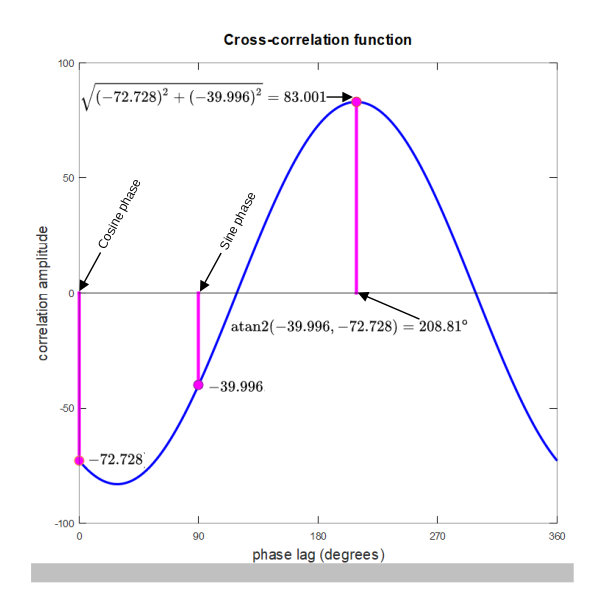Correlation_function.svg

Size of this PNG preview of this SVG file:
600 × 600 pixels
.
Other resolutions:
240 × 240 pixels
|
480 × 480 pixels
|
768 × 768 pixels
|
1,024 × 1,024 pixels
|
2,048 × 2,048 pixels
|
765 × 765 pixels
.
Summary
| Description Correlation function.svg |
English:
The blue curve is the cross-correlation of a square wave and a cosine function, as the phase lag of the cosine varies over one cycle. The amplitude and phase lag at the maximum value are the polar coordinates of one harmonic in the Fourier series expansion of the square wave. The corresponding Cartesian coordinates can be determined by evaluating the cross-correlation at just two phase lags separated by 90º.
|
|||
| Date | ||||
| Source | Own work | |||
| Author | Bob K | |||
|
Permission
( Reusing this file ) |
I, the copyright holder of this work, hereby publish it under the following license:
|
|||
|
SVG development
InfoField
|
This W3C-
invalid
vector image
was created with
LibreOffice
.
|
|||
|
Gnu Octave source
InfoField
|
click to expand
This graphic was created with the help of the following Octave script: graphics_toolkit gnuplot
pkg load signal
#{
The gnuplot graphics toolkit is not actively maintained and has a number
of limitations that are unlikely to be fixed. Communication with gnuplot
uses a one-directional pipe and limited information is passed back to the
Octave interpreter so most changes made interactively in the plot window
will not be reflected in the graphics properties managed by Octave. For
example, if the plot window is closed with a mouse click, Octave will not
be notified and will not update its internal list of open figure windows.
The qt toolkit is recommended instead.
#}
set(0, "DefaultAxesTitleFontWeight", "bold")
set(0, "DefaultAxesFontWeight", "bold")
set(0, "DefaultAxesFontSize", 14)
P = 2000; % signal duration
x = 0:P-1; % sampling times
% Any function will do for the signal. It needn't be periodic, but a square wave is convenient.
period=233; % square wave period
s = square((x-period*.67)*2*pi/period);
n = 4; % a harmonic (any harmonic will do)
num_angles=1000; % eval the correlation function at 1000 phases
correl = [];
phi = (0:1:num_angles-1)/num_angles;
for m=phi
% The right-hand side is equivalent to sum(s.*cos(2*pi*(n/P*x - m))
correl(end+1) = real(sum(s.*exp(-i*2*pi*(n/P*x - m))));
endfor
figure("position",[1 1 700 700])
plot(phi*360, correl, "color","b", "linewidth",3)
xlim([0 360]);
set(gca, 'xtick', [0 1 2 3 4]*90);
[maxval,idx] = max(correl);
cossin = sum(s.*exp(i*2*pi*n*x/P))
% The next two things are equal
mod(atan2(imag(cossin), real(cossin))*360/(2*pi), 360)
(idx-1)*360/num_angles
% The next two things are equal
maxval
abs(cossin)
hold on
stem((idx-1)*360/num_angles, correl(idx), "filled", "linewidth",4, "color",[1 0 1], "markerfacecolor",[1 0 1])
stem( 0,correl( 0*num_angles/360+1),"filled", "linewidth",4, "color",[1 0 1], "markerfacecolor", [1 0 1])
stem(90,correl(90*num_angles/360+1),"filled", "linewidth",4, "color",[1 0 1], "markerfacecolor", [1 0 1])
title("Cross-correlation function", "fontsize",14);
xlabel("phase lag (degrees)", "fontsize",14)
ylabel("correlation amplitude", "fontsize",14)
|

|
This media file is uncategorized.
Please help improve this media file by adding it to one or more categories, so it may be associated with related media files (
how?
), and so that it can be more easily found.
Please notify the uploader with
{{subst:Please link images|File:Correlation function.svg}} ~~~~
|
Captions
Example of using two points of a correlation function to determine the location and height of its maximum
